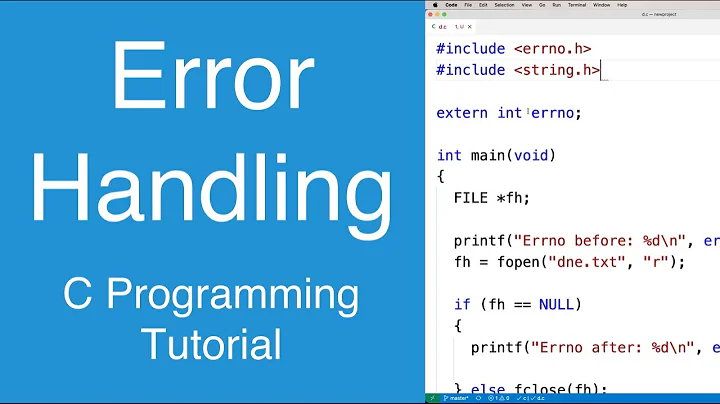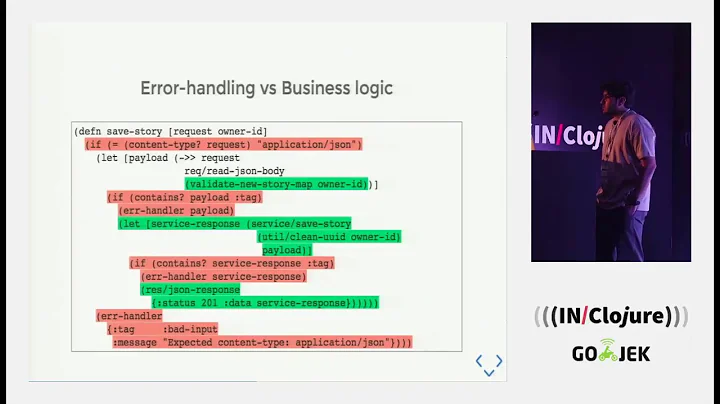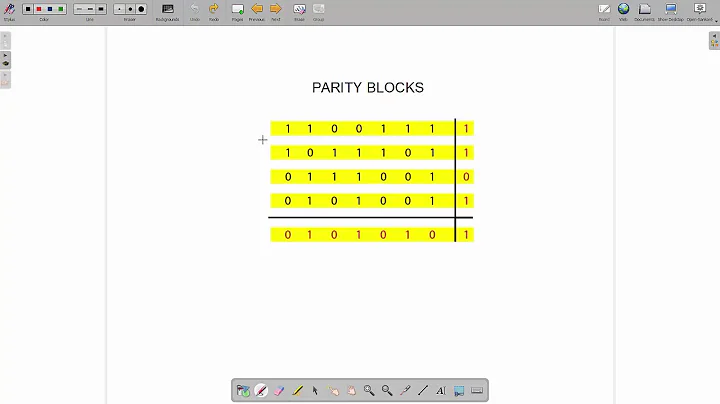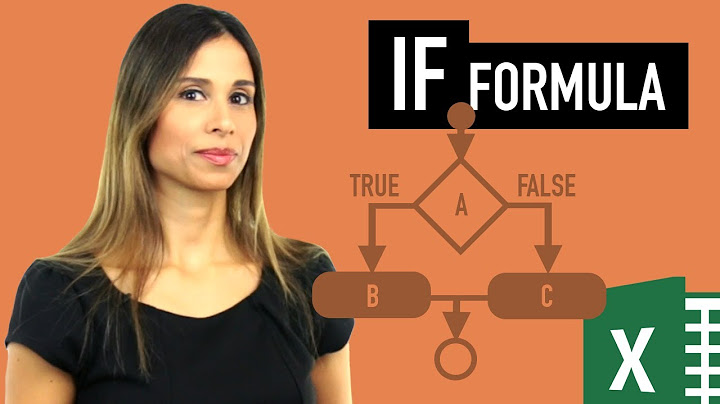Elegant error checking
Solution 1
Another macro-based approach which you can use to mitigate the shortcomings in C fairly easily:
#define CHECK(x) do { \
int retval = (x); \
if (retval != 0) { \
fprintf(stderr, "Runtime error: %s returned %d at %s:%d", #x, retval, __FILE__, __LINE__); \
return /* or throw or whatever */; \
} \
} while (0)
Then to invoke it you have:
CHECK(doSomething1());
CHECK(doSomething2());
// etc.
For bonus points you could easily extend the CHECK macro to take a second argument y that is what to do on failure:
#define CHECK(x, y) do { \
int retval = (x); \
if (retval != 0) { \
fprintf(stderr, "Runtime error: %s returned %d at %s:%d", #x, retval, __FILE__, __LINE__); \
y; \
} \
} while (0)
// We're returning a different error code
CHECK(someFunction1(foo), return someErrorCode);
// We're actually calling it from C++ and can throw an exception
CHECK(someFunction2(foo), throw SomeException("someFunction2 failed")):
Solution 2
Usually, in C, one uses goto for error handling:
int foo()
{
if (Function1() == ERROR_CODE) goto error;
...
struct bar *x = acquire_structure;
...
if (Function2() == ERROR_CODE) goto error0;
...
release_structure(x);
return 0;
error0:
release_structure(x);
error:
return -1;
}
This can be improved with macros and more clever instruction flow (to avoid repeating cleanup code), but I hope you see the point.
Solution 3
I think you should look at exceptions and exception handling. http://www.cplusplus.com/doc/tutorial/exceptions/
try{
callToUnderlyingLibrary1();
callToUnderlyingLibrary2();
callToUnderlyingLibrary3();
}catch(exception& e)
//Handle exception
}
your library functions can throw exceptions if there is an error
Solution 4
Here is a proposition, you may or may not like it:
- make your functions return 0 on failure, something else on success
- if something fails in your functions, have them set a global (or static) variable to the error code (like
errno) - create a
die()function that prints the error depending of the error code (or whatever you want it to do) - call your functions with
do_something(foo, bar) || die("Argh...");
Solution 5
I prefer a variant of Alexandra C.'s goto-approach:
int foo()
{
int rv = 0;
struct bar *x = NULL;
struct bar *y = NULL;
rv = Function1();
if (rv != OK){
goto error;
}
//...
x = acquire_structure();
if (x==NULL){
rv = ERROR_MEMORY;
goto error;
}
//...
rv = Function2();
if (rv != OK){
goto error;
}
//...
y = acquire_structure();
if (y==NULL){
rv = ERROR_MEMORY;
goto error;
}
//...
rv = release_structure(x);
x = NULL;
if (rv != OK){
goto error;
}
rv = release_structure(y);
y = NULL;
if (rv != OK){
goto error;
}
return OK;
error:
if (x!=NULL){
release_structure(x);
}
return rv;
}
When you use multiple goto-destinations, it is easy to mix them up. Or perhaps you move the initialization of a variable, but forget to update the gotos. And it can be very difficult to test all ways a C-method can fail.
I prefer having a single goto-destination that performs all the cleanup. I find that makes it easier to avoid mistakes.
Related videos on Youtube
Ren
Updated on June 17, 2022Comments
-
Ren almost 2 years
Our code (in a simple library implementation) is beginning to look like this:
err = callToUnderlyingLibrary1(); if (err!=0) { printf ("blah %d\n", err); ... } err = callToUnderlyingLibrary2(); if (err!=0) { printf ("blah %d\n", err); ... } err = callToUnderlyingLibrary3(); if (err!=0) { printf ("blah %d\n", err); ... }This is cumbersome and ugly. Is there a better way to do this ? Perhaps using the C preprocessor ? I was thinking something like:
CHECK callToUnderlyingLibrary1(); CHECK callToUnderlyingLibrary2(); CHECK callToUnderlyingLibrary3();where the CHECK macro invokes the function and does the rudimentary error checking.
Are there preferred idiomatic ways of handling this ?
-
Oliver Charlesworth over 12 yearsYou should probably pick either C or C++, not both. In C++, the canonical answer will involve exceptions. In C, it will not.
-
Ren over 12 yearsGood idea. Let me remove the C++ tag.
-
hari over 12 yearsI wish I could give more
UP votes!!! -
Roddy over 12 yearsAs you originally tagged it C and C++, is it a fair assumption that this involves a C library being invoked from C++ code??
-
Ren over 12 years@Roddy: Yes. But our code is really a very thin layer on top of the C library, so it is really C for all practical purposes.
-
 Mouna Cheikhna over 12 years+ 1 for wanting a better way to do this :)
Mouna Cheikhna over 12 years+ 1 for wanting a better way to do this :)
-
-
Ren over 12 yearsYes, that would have been nice, but unfortunately, it's not an option for us. We are tied to using a certain underlying library, which does not throw exceptions.
-
Alexandre C. over 12 yearsI won't downvote since the C++ tag has been removed after your answer. But the question deals with C, which has no
try/catchconstruct. -
Ren over 12 yearsRight. My fault for including the C++ tag to begin with. Please don't downvote this answer, which would apply correctly to C++.
-
Roddy over 12 years@Ren: Can you make a C++ wrapper for the library, then? Usability of most C libraries can be enormously improved for C++ with wrapper classes and a sprinkling of RAII and exceptions.
-
Roddy over 12 yearsGotos in Macros :-) Thanks for reminding me why I program in C++ when possible!
-
Alexandre C. over 12 years@Roddy: if you keep the functions short and if you have some discipline, there is nothing wrong with this approach. Gotos and macros have their use here.
-
Ren over 12 years@Roddy: Noted. I think that would be a good long-term enhancement of the codebase.
-
pmg over 12 yearsThese
gotos are not in macros! :) -
Roddy over 12 years@Alexandre: yes - in C you have to live with the cards that the language has dealt you - and Macros and gotos are essential ones. But personally, I don't have the necessary disipline to stay in control of that, which is why C++ and RAII works for me :-)
-
Alexandre C. over 12 years@Roddy: sure, you're right. I stay away from C when I can. Sometimes you don't have the choice of the language though.
-
Seth Carnegie over 12 yearsIf your functions returned 0 on success,
do_something(foo, bar) || die("Argh...");would calldieon success. -
fluffy over 12 yearsThat's pretty bad macro style that leads to all sorts of weird parse issues, not to mention you have a macro that's suddenly expecting something about variables in the enclosing scope.
-
Seth Carnegie over 12 years@fluffy What are some examples of weird parse issues?
-
luser droog over 12 yearsThis technique tends to generate spurious compiler warnings about 'value calculated is not used' unless you wrap it
(void)(...) -
fluffy over 12 yearsif (someCondition) CHECK(blah); else CHECK(otherblah); - it's better to wrap a multi-statement macro in a do { ... } while (0) for this reason as it fixes pretty much all those situations.
-
Seth Carnegie over 12 years@fluffy why would
if (someCondition) CHECK(blah); else CHECK(otherblah);cause problems? -
fluffy over 12 yearsBecause it's a multi-line expression, but CHECK is not enclosed in curly braces. Expand the macro out yourself; you end up with:
if (someCondition) (err=x()); if(err){...}else (void)0; else (etc.)which doesn't even parse. -
Seth Carnegie over 12 years@fluffy ah ok, I see what you mean.
-
hlovdal about 11 yearsGotos in macros can be quite nice, however always pass the label to jump to as a parameter to the macro. This makes the macro more flexible as well as not hiding that execution might continue somewhere other than the next line.
-
Emile Vrijdags over 7 yearswhat does it mean to have elegant code: quora.com/What-does-one-mean-by-elegant-code . one return statement has little value and usually stems from a misconception: softwareengineering.stackexchange.com/questions/118703/…
-
alexs973 over 5 yearsWhy do you choose to use a macro, and not a function / inline function?
-
fluffy over 5 years@alexs973 Because in this case the thing needs to be able to return from the function that's calling it, and also the question was for C-language so exceptions are not supported.
-
 Julian about 2 yearsIs there anyway to obtain information about the function being called or its parameters?
Julian about 2 yearsIs there anyway to obtain information about the function being called or its parameters? -
fluffy about 2 years@Julian The
#xparameter tofprintfincludes the string version of the first parameter in the error log. What additional information are you trying to obtain? Unfortunately preprocessor macros are pretty limited in what sort of scope-level information they can get.










